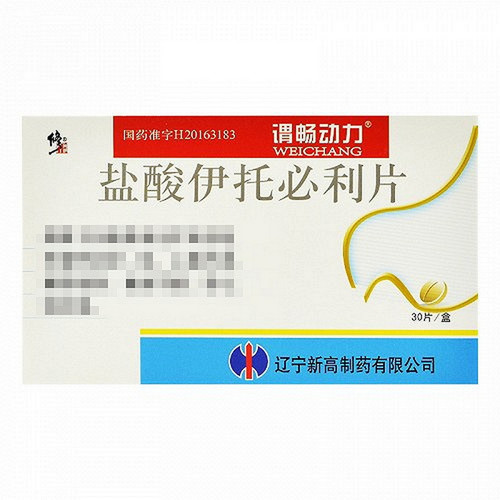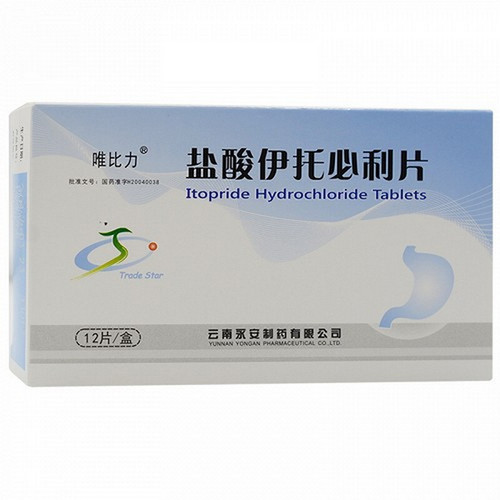Product Overview
[Drug Name]
Generic Name: Itopride Hydrochloride Tablets
Trade Name: Elthon
English Name: Itopride Hydrochloride Tablets
Chinese Pinyin: Yansuan Yituobili Pian
[Ingredients]
Chemical Name: N-[p-[2-(Dimethylamino)ethoxy]benzyl]-3, 4-dimethoxybenzamide hydrochloride
[Properties]
This product is a white film-coated tablet that appears white after removal of the film coating.
[Indications]
This product is indicated for the treatment of various symptoms associated with functional dyspepsia, such as upper abdominal discomfort, postprandial fullness, premature satiety, loss of appetite, nausea, and vomiting.
[Dosage and Administration]
The usual adult dose of itopride hydrochloride is 50 mg three times daily, taken orally before meals. The dose may be adjusted based on the patient's age and symptoms. The tablet may be split and taken orally. If symptoms do not improve significantly after two weeks of treatment, the drug should be discontinued.
[Adverse Reactions]
1. Allergic symptoms: rash, fever, itching, etc.
2. Digestive System: Diarrhea, abdominal pain, constipation, increased salivation, etc.
3. Psychoneural System: Headache, tingling, sleep disturbances, dizziness, etc.
4. Hematological System: Leukopenia. If abnormalities are confirmed, discontinue administration.
5. Rarely, elevated blood urea nitrogen (BUN) and creatinine levels may occur. Increases in AST, ALT, and prolactin (within the normal range) have been reported.
6. Other: Chest and back pain, fatigue, numbness in the fingers, hand tremors, etc.
[Contraindications]
1. Contraindicated in patients with allergies to this product's ingredients.
2. Contraindicated in patients with gastrointestinal bleeding, mechanical obstruction, or perforation.
[Precautions]
1. This product can enhance the effects of acetylcholine; therefore, caution should be exercised during use.
2. If this product is ineffective, avoid long-term, unintended use.
3. Use with caution in patients with severe hepatic or renal impairment.
4. If prolonged QTc interval is observed on the electrocardiogram during use, discontinue the drug.
[Use in Special Populations]
Precautions for Children:
Safety data for this product in children have not been established; its use should be avoided.
Precautions for Pregnancy and Lactation:
1. Because the safety of this medication in pregnant women has not been confirmed, it should only be administered to pregnant women or women of childbearing potential when the therapeutic benefits outweigh the risks.
2. Because it has been reported in animal studies (rat studies) that this drug can be transferred into breast milk, breastfeeding should be avoided while taking this medication.
Precautions for Elderly Patients:
Due to decreased physiological function in the elderly, they are more susceptible to adverse reactions. Therefore, elderly patients should be carefully observed after taking this medication. If adverse reactions occur, the dosage should be reduced or the drug should be discontinued.
[Drug Interactions]
No serum protein binding interactions have been observed with warfarin, diazepam (Valium), diclofenac, ticlopidine, nifedipine, or nicardipine. Itopride is not metabolized by cytochrome P450 enzymes but primarily via the flavin monooxygenase pathway, so drug-drug interactions are not expected. Anticholinergic drugs may attenuate the effects of itopride. Anti-ulcer drugs such as cimetidine, ranitidine, teprenone, and cetraxate do not affect the prokinetic effects of itopride hydrochloride.
[Pharmacological Actions]
This product exhibits both dopamine D2 receptor antagonist activity and acetylcholinesterase inhibitory activity, exerting a synergistic effect on gastrointestinal motility. Furthermore, due to its antagonistic effect on dopamine D2 receptor activity, it also has a certain antiemetic effect.
[Storage]
Store at room temperature.
[Strength]
50 mg
[Packaging Size]
10 tablets/box
[Expiry Life]
36 months
[Approval Number]
National Medical Products Administration Approval No. J20160075
[Manufacturer]
Company Name: Abbott Japan Co., Ltd.






